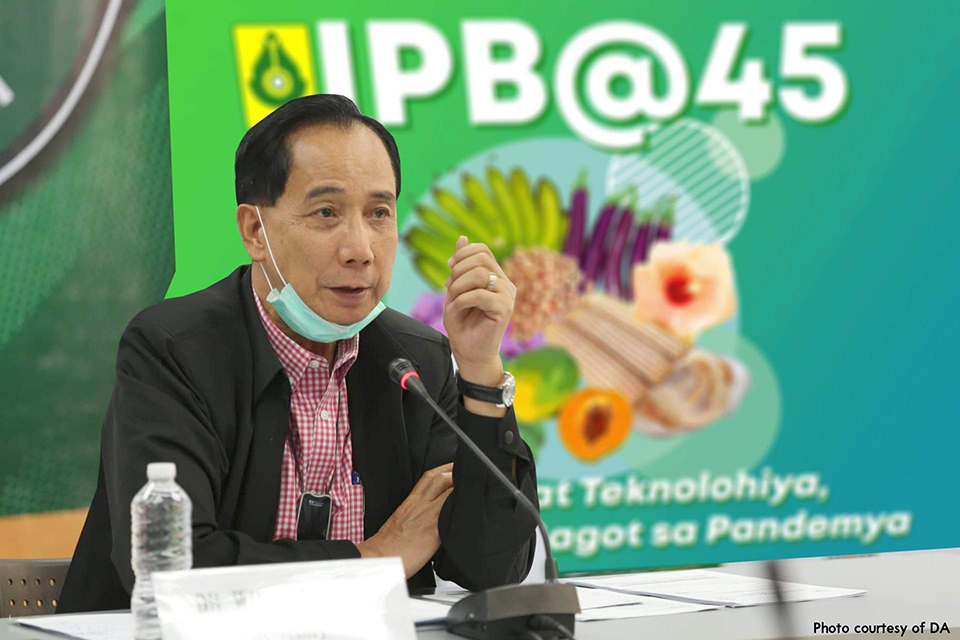
Author: DA Communications Group | 8 June 2020
Agriculture Secretary William Dar acknowledged the Institute of Plant Breeding (IPB) for partnering with the government in increasing the productivity and income of farmers through the use of high-yielding disease-resistant resilient and sturdy crop varieties.
“Competitiveness is the name of the game. We need more varieties that are more resilient, drought-resistant, and varieties that can properly and efficiently use the inputs. This is one challenge I would post the breeders to consider looking at every opportunity using crop improvement or newer tools of science to reduce cost but at the same time having to increase the yield per unit area,” Secretary Dar said during “45th Founding Anniversary of IPB” on June 5, 2020 at the University of the Philippines Los Baños (UPLB), College, Laguna.
IPB, created under Presidential Decree 729 in 1975, has developed more than 170 varieties approved by the National Seed Industry Council and the IPB Germplasm and Technology Registration and Release Office. These varieties of various crops—from fruits, vegetables, and legumes to cereals and herbals—have been planted by farmers and growers nationwide and used in the national program for increased crop production.
With IPB’s anniversary theme, “IPB @45: Agham at Teknolohiya, Ani at Kita, Sagot sa Pandemya,” Secretary Dar disclosed that harnessing the power of science and technology and many other strategies, the Philippine Agricultural Food Development Framework has just approved by the IATF.
“Our vision has now broadened—a food secure and resilient Philippines with prosperous farmers and fishers,” he said.
According to the secretary, the Philippine agriculture currently faces an immense challenge of feeding a growing population in the face of diminishing land and water resources, worsening impact of climate change, and rising costs of producing food. Rural incomes must also increase to enable farmers improve their standard of living.
“But we are turning these challenges into opportunities. This time around, while surviving we need to start planning for the rebooting of this sector,” Secretary Dar said.
He added that now is not the time to rest on past laurels. As such, he encouraged the management of IPB to expand strategic partnerships with sectors and groups such as agribusiness companies and local government units to bankroll R&D initiatives.
“At kami naman sa Kagawaran ng Pagsasaka ay patuloy na aagapay sa inyo, sa pamamagitan ng pagbibigay ng kaukulang pondo at iba pang tulong. Kabilang dyan ang mga nakaplano nating proyekto na magtayo ng Seed Technology Park,” he continued.
The Department of Agriculture (DA) implemented the urban agriculture program so that the household can produce their own vegetables and fruit requirements during this pandemic.
“I believe that the war against Covid-19 is not yet over. We are just in the middle of this war. We are investing P0.5 billion to support this urban agriculture-backyard gardening including that of backyard livestock and poultry raising,” the DA chief explained.
According to him, the DA will support initiatives on massive seed and seedling production of the varieties of crops that can be promoted in various provinces all over the country.
“You may have to do it in tandem with other universities or research institutions in the country. I am also mobilizing the research stations and outreach stations of the DA to do the same,” he said.
Dar added that the Department is always open to receive ideas or proposals that will continue and intensify the Institute’s breeding and crop improvement efforts.
“I’m confident that you’re up to these challenges. Inaasahan ko at ng buong bansa na marami pang makabagong binhi at mahusay na pamamaraan ng pagsasaka ang ipapamahagi ng UPLB mas lalo na ang IPB. Kaya muli, maraming salamat sa inyong ambag sa bayan, he concluded. ### (Jo Ann Grace B. Pera, DA-AFID)











